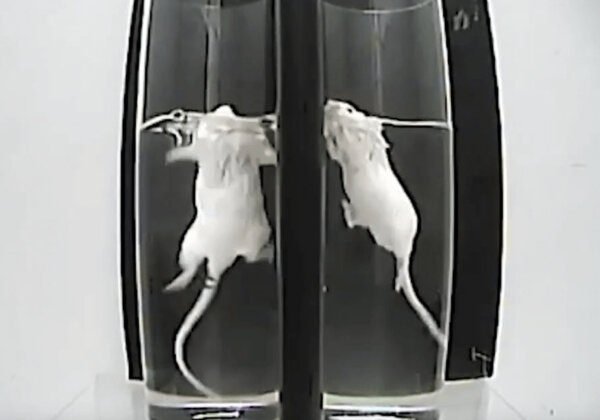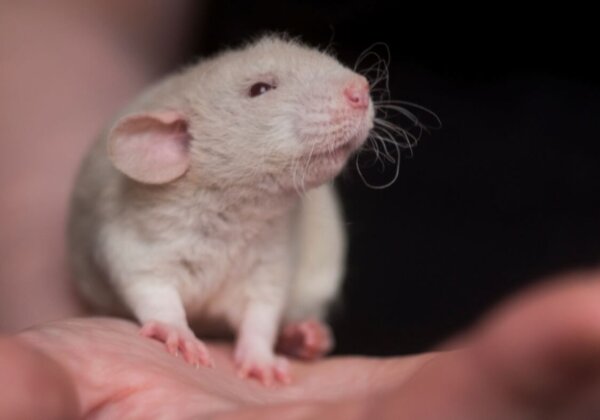Scientific Paper Pokes Holes in Flimsy Pharma Defence of Forced Swim Test
Last week, PETA US neuroscientist Dr Emily Trunnell, along with psychologist Dr Constança Carvalho, published a paper in the esteemed journal Drug Discovery Today. The paper – which examined the use of the cruel “forced swim test” by the 15 most profitable pharmaceutical companies in the world – shows that this decades-old, unscientific experiment on animals was not useful in determining whether a test substance would be effective in treating human depression.

What Is the Forced Swim Test?
In the forced swim test, experimenters put mice, rats, guinea pigs, hamsters, or gerbils in inescapable containers filled with water. The panicked animals try to climb up the sides of the beakers or even dive underwater in search of an exit. They paddle furiously, desperately trying to keep their heads above water. Eventually, they’ll become immobile and start to float.
Laboratory staff dose some animals used in these tests with human antidepressant drugs to see if they struggle and swim for longer than others before starting to float. Although the terrifying experience that rodents endure in laboratories is nothing like what humans suffering from depression go through in a real-world setting, the results of the forced swim test are somehow supposed to predict how drug compounds will affect human brain chemistry.
The paper found that at least 15,238 animals had been used in forced swim test experiments and 109 compounds had been tested.
Of the 109 compounds tested, only 31 have been investigated for their possible effects on any type of depression experienced by humans. Of these 31 compounds.
Furthermore, none of the compounds is currently approved for the market.
The Tide Is Turning Against the Forced Swim Test
Fifteen pharmaceutical companies – including Johnson & Johnson, Bayer, GlaxoSmithKline, AbbVie Inc, Roche, AstraZeneca, Novo Nordisk A/S, Boehringer Ingelheim, Pfizer, and Bristol Myers Squibb – and two research universities have already banned the forced swim test after hearing from PETA scientists.
And, following a push from PETA UK, influential scientists working for the UK’s Medicines and Healthcare products Regulatory Agency concluded in a scientific paper published in the journal Regulatory Toxicology and Pharmacology that the forced swim test (and equivalent tests on animals) can’t predict the effectiveness of potential new antidepressant drugs. In that article, the authors cited PETA’s work with pharmaceutical companies to end the test.
This new paper is another nail in the coffin for the flawed forced swim test. Previous papers published by co-author Dr Carvalho have demonstrated that favour data from human-relevant, non-animal methods over data from experiments on animals.
Help Animals in Laboratories and Humans With Depression
The forced swim test is bad science. These experiments do nothing more than terrify animals and delay the development of new, effective treatments for humans who desperately need them. You can speak up for animals used in the forced swim test by urging pharmaceutical giant Eli Lilly to ban it immediately.







